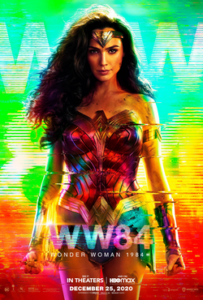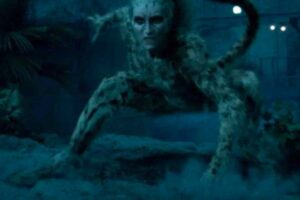Wonder Woman 1984
Reviewed by Will Morgan 22-Jan-21
There’s stuff to like about Wonder Woman 1984, and some stuff to dislike, but it is all spoiled by one horrible, horrible plot thread.
 Not Quite the “Submission To Loving Authority” We Had In Mind
Not Quite the “Submission To Loving Authority” We Had In Mind
Wonder Woman. Princess of Paradise Island. Hero. Warrior. Diplomat.
And now, apparently a sex criminal.
But we’ll get to that.
Here are the good things about Wonder Woman 1984:
Gal Gadot is flawless; I have not one adverse comment about her. At times she’s clearly struggling with a script that is, to be polite, uneven, but by Cracky, she sells it hard.
Some (not all) of the fight scenes were inventive and entertaining, and the opening scene of the young Diana competing with adult Amazons in a series of trials was breathtaking, and clearly where a huge chunk of the budget went—it ran a little long, but then I’m old, and painfully aware of how few years I have remaining on this planet. It was stunning nevertheless, and as a side note, I was pleased to see the Amazons’ outfits being markedly less stripperific than they were in the Justice League movie.
I liked the fact that they tried to give us a different take on villainy than the usual cinematic “nebulous god/energy being thing with undefined zappity-zap powers”. Unfortunately, the actor portraying Maxwell Lord, Pedro Pascal, is not, on the evidence given here, charismatic enough to convey a character whose entire deal is predicated upon charisma. And Kirsten Wiig, reliably vapid and irritating as the Cheetah, comes across simply as a dollar-store Catwoman.
I applaud the acknowledgment that the core of Diana’s powers, in this modern iteration, comes from her belief in Truth, and that as her abilities diminish during the course of the film, she realises and acknowledges why, and makes an appropriately heroic decision.
There are several very clever moments… but too few, too far apart, and separated by too much beige wadding.
The script is often clunky exposition, the pacing saggy in the mid-section, and Chris Pine as Diana’s lost love is… largely pointless, when he’s not actually getting in the way of the narrative. His default expression of open-mouthed imbecility rapidly grates, and too much of the movie is devoted to giving him things to do in situations where, by any common-sense standard, he’s superfluous to requirements.
 But so far, so what? A superhero movie with some good moments, some unsatisfactory performances, in almost every respect a overall “meh”. Not the worst super-flick ever.
But so far, so what? A superhero movie with some good moments, some unsatisfactory performances, in almost every respect a overall “meh”. Not the worst super-flick ever.
Except. The crux of the movie’s Big Bad is a magical talisman which grants wishes. Before it passes on to Maxwell Lord, it briefly goes through the hands of Diana, and she wishes for the return of her lost love. Who returns as a spirit possessing the body of a man who is a total stranger to Diana. The couple, after Diana’s initial doubts are allayed, reunite joyously and are shown the next morning naked in bed together.
The unavoidable implication, then, is that Diana and ghost-Steve, doing a Deadman, decided to have sex while using the body of an unwitting and non-consenting man.
Whose body, I might add, is then exposed to multiple life-threatening dangers as “Steve” accompanies Diana on her adventures.
People have accused me of making too much of this, but as I’ve pointed out several times previously in other posts, reversing the genders of a rape or sexual assault doesn’t, actually, magically make it all okay.
If this had been a film directed by a man, in which the male hero and the spirit of his female lover colluded in the rape of an unconscious and therefore non-consenting woman—subsequently putting that woman’s body in numerous potentially fatal situations—then it would have brought on a justifiable avalanche of criticism of said director.
So, how is this supposed to be different? No, I’m not calling for the dismissal of Director Patty Jenkins, but I would urge people to think a bit harder about what they’re putting on screen.
Particularly since, by the flawed internal logic of the film itself, it wasn’t even necessary.
Because the magic talisman, once it passes into the hands of Maxwell Lord, proves itself eminently capable of materialising wishes out of thin air. So why not just bring Steve Trevor back with a whole new, free-range, body? Or, failing that, seize him from the timeframe immediately before his 1918 death and plonk him down in 1984?
Either would have been a plausible scenario, and would have avoided this unfortunate character—not even named, and credited only as “Handsome Man”, when honestly “Walking Dildo” would have been more appropriate—having not only his bodily integrity, but his whole life shoplifted.
What about his work? Family? Friends? Relationship? Okay, you could argue Diana and ghost-Steve save the world, so his life and everyone else’s would have gone tits-up if they hadn’t, but it’s disappointing that not even a moment’s acknowledgment is given to his situation. The few times Diana and “Steve” mention him, it’s to mock his wardrobe and criticise the décor of his home that they’ve invaded.
This entire thoughtless and needless plot strand takes this film from being a mediocre piece of cinema to an egregious level of offensiveness.
Gal Gadot, as mentioned earlier, shines as a perfect evocation of the character; like Margot Robbie’s Harley Quinn in the cinematic Suicide Squad/Birds of Prey franchises, her performance deserve a much, much better vehicle.
Perhaps some day she’ll get one.
Tags: DCEU, Gal Gadot, Patty Jenkins, Wonder Woman